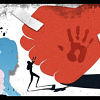The many faces of gender-based violence and herd mentality

Social media acted as an incubator for the July uprising. And the heat for that incubator came through human energy: it was not just "manpower," it had an equal share of "girl power." On July 14, female students from Dhaka University's Rokeya Hall were the first to break the hall gate, protesting against the "Razakar" branding of student protesters by the now-fallen prime minister. The heavily guarded male halls prevented the boys from being there first. Two images have stuck in our mind from the early days of the uprising: the attack on a girl with a machete by a helmet-clad Chhatra League goon in front of Rokeya Hall, and the defiant march of two residents of the hall, one wearing Western clothes and the other wearing hijab. The extraordinary courage shown by the female students can be best summed up by the image of a young girl with a backpack trying to stop a police van with her arrested friend from leaving the High Court area.
This is the generation that is no stranger to protest. We have seen their overwhelming presence during the Road Safety Movement (2018) and Rage against Rape (2020). Tactically, protesters often place women at the forefront of protest marches, hoping law enforcement agencies would show some leniency. But the kind of brutality with which police attacked the women protesters last year was unprecedented, adding fuel to the public outrage that led to the fall of the previous government. The transition to an anti-discriminatory government stirred some hope of attaining gender parity. But that optimism was marred when only male student representatives were included in the interim government.
The announcement of the Bangla Academy Prize without a female nominee continued the trend. After criticism, the award declaration was postponed. But when the vetted awardees hit the stage, we noticed that there was no change in the gender portfolio. What's even more alarming is the social unrest that has accompanied the political transition. Certain groups, led to believe they can act with impunity, exhibit a peculiar herd mentality. With the focus of law enforcement and the judiciary diverted in dealing with demands, sabotage, and external threats, there is a systemic rise in the abuse and violence of marginal groups, including women. Women, especially those who are vocal or visible, have become soft targets of public scorn.
Our women footballers, for instance, received threats of murder and rape, prompting Bangladesh Mahila Parishad to register a protest. The tears of our booters who brought two SAFF Championship titles for the nation—which earned the team this year's Ekushey Padak—contradict the spirit of the anti-discriminatory movement. In an emotional press conference, the players revealed the mental torture inflicted by their English coach that had drained them out. Instead of garnering sympathy, these women were bullied on social media by a mob who don't want to see women perform in the public spheres.
The hurdles faced by members of the national team epitomise the growing resistance against women's sports in peripheral areas. Local seminary teachers stopped two female football tournaments, citing women's participation in sports as "un-Islamic." Yet, it was these sportswomen who united a divided country by lifting the championship trophy in Nepal.
So, where did we go wrong? Why is there a public demand for the removal of Begum Rokeya's name from the university in Rangpur? The pioneer of female education in Bengal has come under serious scrutiny for her alleged involvement in "leading the women astray." Earlier, a group blackened one of Begum Rokeya's sculptures because they found it a distraction from their prayers. We have seen celebrities being boycotted or stopped from attending ceremonies. This is a regress from the powerful role played by women in the ouster of the previous regime. It exemplifies the patriarchal orientation of the systemic challenges that we are seeing all around.
The desire to "de-sire" the fascist regime has united us, but it seems the desiring machine, as Gilles Deleuze and Félix Guattari would call it, has been manipulated to orchestrate a herd mentality. In this machine, individuals are not isolated beings but part of a large network of desire-driven connections. Alternative societal norms and institutions manipulate or repress our desires in an anti-authoritarian atmosphere. We are forced to conform to collective behaviours that stifle individuality. The moral policing and collective aggression that we are seeing are products of a social machine that demands unquestioning conformity. They strive to establish a homogenous and inclusive group. The exclusion of women, by extension of indigenous entities, from the calculus is no accident.
Herd mentality is supported by a molar structure that suppresses diversity and enforces uniformity. The pervasive victim-blaming or slut-shaming that we have seen recently is symptomatic of such a structure. Its insidious nature became evident when social media erupted with the search for an 11-year-old girl who had reportedly gone missing in Dhaka recently. Police found her in Naogaon, and we were told that she eloped with a young man aged 19 or 22 years, who was following her on social media. This could very well be a case of grooming by a paedophile. The adolescent girl wanted to escape the trauma of her ailing mother, who came to Dhaka from Barishal for cancer treatment. Once the truth came out, the girl became the target of online bullying and shaming. The potential groomer of sexual exploitation received little or no attention. This is one of many such cases that highlight our society's tendency to shame victims rather than hold perpetrators accountable.
Around the same time, the body of a 13-year-old girl was discovered in Hatirjheel Lake 17 days after she had gone missing. Police nabbed two suspects who confessed to gang rape, murder, and dumping the body.
Police data shows a sharp rise in gender-based violence. With all the talk of reforms, it's crucial to implement policy adjustments, such as awareness campaigns, to halt the manipulation of the desire machine that perpetuates patriarchy and other societal phenomena. We need legal reforms, societal education, empowerment of women, support for feminist movements, and international collaboration.
Let me end on a positive note. We can draw inspiration from a recent story involving a 14-year-old from Rajshahi. Faced with the prospect of child marriage at the age of 13, she fled her home and sought refuge at her school. The teachers of Rajshahi Alor Pathshala halted the marriage and funded her education. She finished her school with the dream of becoming a teacher one day. This is the Bangladesh that we desire, a country where girls can bloom without being marginalised, humiliated, raped and murdered. After all, they were at the forefront of the fight that brought changes to the system.
Dr Shamsad Mortuza is a professor of English at Dhaka University.
Views expressed in this article are the author's own.
Follow The Daily Star Opinion on Facebook for the latest opinions, commentaries and analyses by experts and professionals. To contribute your article or letter to The Daily Star Opinion, see our guidelines for submission.

 For all latest news, follow The Daily Star's Google News channel.
For all latest news, follow The Daily Star's Google News channel. 










Comments